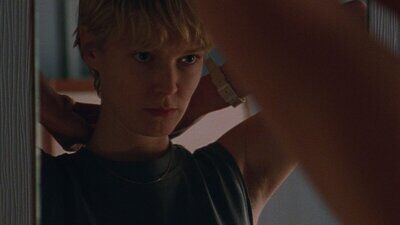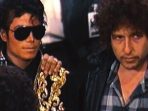One aspect of the film that I thought was really interesting was the contrast between Jean watching “Blind Date” on TV at home, which really normalizes heterosexual dating and behavior, with her finding a copy of Radclyffe Hall’s The Well of Loneliness at her girlfriend’s apartment. “Blind Date” is just out there, available for everyone to watch, but she has to practically stumble into representation with this book.
That was one of my main motivations for telling the story, to think about the barrage of heteronormative messaging that everybody is subjected to. Not just Jean, but Sammy, the little boy. The whole idea is that we all grow up in the same vacuum where we are shown a certain type of experience over and over and over and over and over to the point where it doesn’t matter if it doesn’t even matter if you experience otherness in your immediate family circle, it still appears to be wrong because of all of this other messaging.
I have conversations about that with queer friends all the time. I have a stepdaughter, and she often makes comments that you wouldn’t expect from somebody who has essentially grown up with two mums. You’ll be like, “Why did you just say that?” and she’ll say, “Oh, I’ve watched a thing on Netflix,” and you’re like, “Okay, yeah.” So, I was thinking a lot about that and thinking about how I grew up in a household where we watched “Blind Date” every Saturday night, and no one thought anything of it.
When I was going back through the “Blind Date” archives, I didn’t expect to find such … it feels sort of almost like comedy, because the misogyny is just so pronounced. It’s in every single episode. It just makes the spine tingle. I wanted to think about how, essentially, from my experiences growing up during Section 28, the main takeaway was that if you remove all role models and you remove any conversation around homosexuality, it just sort of ceases to exist in your world.
But then all of these messages get inside you without your permission. You just get hit over the head with it every day, and you don’t even notice the billboards you’re driving past. Or articles in the newspaper. At the time as well, it was a one-newspaper kind of time. If you were working in a school, there was a newspaper that that school decided that they were subscribed to and whatever was the headline that day was what everybody read. It helped shape public opinion. So if something was written—and there were so many headlines that were like “Loony lesbian … blah, blah, blah.” If that’s what everyone’s reading at lunch, you know, and you’re there amongst them, how is that different from the way we experience news now and that kind of thing?
Sumber: www.rogerebert.com
 Skip to content
Skip to content






